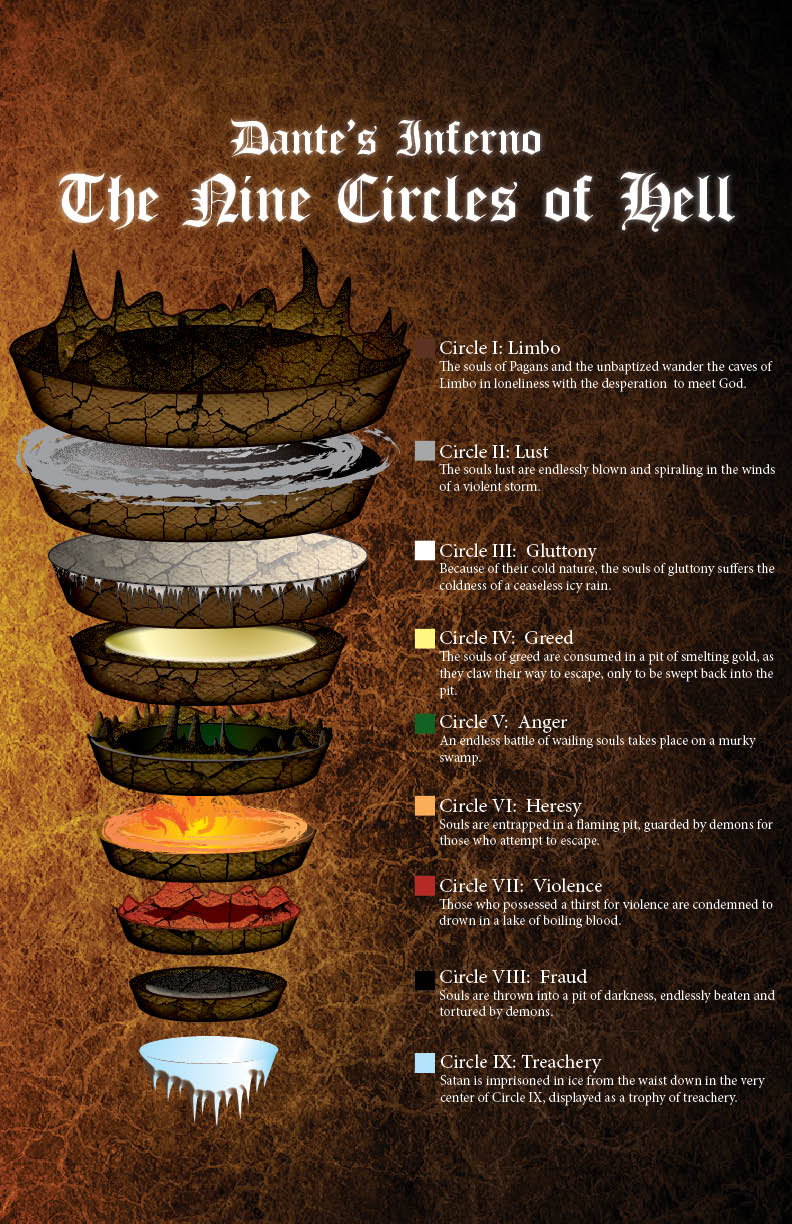Dante
finds himself awake in third circle, the circle of the gluttons. The souls punished for the this sin are
stranded in a torrential rain and deep in mud, exposed to the harshest
elements. The three-headed dog Cerberus who
tears and flays at the spirits, who are wasting away from trying to withstand
the elements. The pilgrims meet someone
from Florence nicknamed Ciacco, which means hog, and he predicts the war
between the White and Black Guelphs that will come in a few years. Dante asks about a list of Florintine patriots,
and Ciacco says they are further below in hell.
(Canto VI)
As
the pilgrims turn into the fourth circle, they encounter Plutus the classical
god of wealth, who is babbling incoherently.
With a few words fro Virgil, who invokes the archangel Michael, Plutus
falls down unconscious. Here is the
circle for the sin of avarice, where the spendthrifts and the tightwads are
pushing stones in counter direction to each other. Dante notices that many religious clerics are
here. and they move on to a marsh which comprises the fifth circle, that of the
wrathful and sullenness. Those souls are
underneath the mire where they are unable to speak, just blow up air bubbles. (Canto VII)
The
pilgrims come to the river Styx where the City of Dis can be seen in the
distance, signaling code with little lights.
A reluctant ferryman named Phlegyas ferries across the river, and the
soul of the Black Guelph Filippo Argenti , tries to avail them. The pilgrims take delight in watching Argenti
get submerged back underwater. On being
dropped at the City gates, Virgil goes off to attempt to enter, while Dante
stays back in fear. Virgil has the gates
slammed in his face, and so the pilgrims are prevented from entering. (Canto VIII)
With
the gates of Dis closed the pilgrims have come to a crises. While the pilgrims still in their doubt, the
three furies, winged infernal goddesses, screech above and summon up Medusa to
turn the living person into stone.
Virgil himself covers Dante’s eyes to ensure his safety. Meanwhile an angel from heaven, unnamed
though possibly the archangel Michael,
comes to the pilgrims’ rescue by scattering all the infernal spirits and
with a touch of his wand, opens the city gates.
The pilgrims walk in and into the sixth circle, where the sin of heresy
is punished, where the heretical souls reside in tombs. (Canto IX)
The
pilgrims walk through the sixth circle in an area where the Epicureans reside,
those who only believe the material world exists. Here they lay in sepulchers with the lids
open, laying on a bed of fire until the last judgment. Suddenly the famous Ghibelline, Farinata
delgli Uberti, have rises up out of his tomb to enquire about Dante’s family. While they discuss the events of Farinata’s life,
another soul, Cavalcanti, the father of Dante’s one time best friend and fellow
poet, Guido Cavalcanti, sticks his head up from the sepulcher and enquires
about his son. Before Dante can answer
him, he sticks his head back down and Farinata finishes his conversation, until
he too returns to his bed of fire.
(Canto X)
At
the inner edge of the sixth circle, the two pilgrims come across the tomb of
Pope Anastasius and move on. They come
to the rim and can sense the stench that comes from below, and so Virgil
recommends they stop and get accustomed to the smell before moving down. While they wait, Virgil describes the
structure of hell. It is divided into
three overarching parts; the first part are the sins of incontinence, the first
five circles, sins from a lack of control; the second part, those inside the
City of Dis are the sins of malice, heresy and violence, circles six and
seven. Finally come the sins of Fraud,
which are contained within the eighth and ninth circles. (Canto XI)


Another good overview. I'd highlight the 'compare and contrast' thing on the fifth (I think) terrace: avarice and prodigality. Dante shows either extreme as a bad idea - - - a balanced view, but a 'hard sell' in some social circles.
ReplyDeleteI'm looking forward to your next installment.
Great. I'm glad you're reading along and getting something out of this. This is why I post this blog!
Delete